It's no secret that the bigger the vehicle, the bigger the tires. However, does that mean bigger tires need more PSI than smaller ones? We did the research to bring you the answer. Let's take a look below.
The size of a tire doesn't determine the amount of PSI it needs. Instead, it's the weight of the vehicle and how much weight each tire can carry that determines how much PSI is needed. In other words, a bigger tire will have more air volume, but it doesn't necessarily need more air pressure.
It's vital to understand how much PSI your tires need because putting too much or too little PSI in them can cause problems. In this article, we will discuss how PSI works, what the right PSI is for your tires, and how to check your tires' PSI. In addition, we will answer other frequently asked questions about tire PSI, so read on!
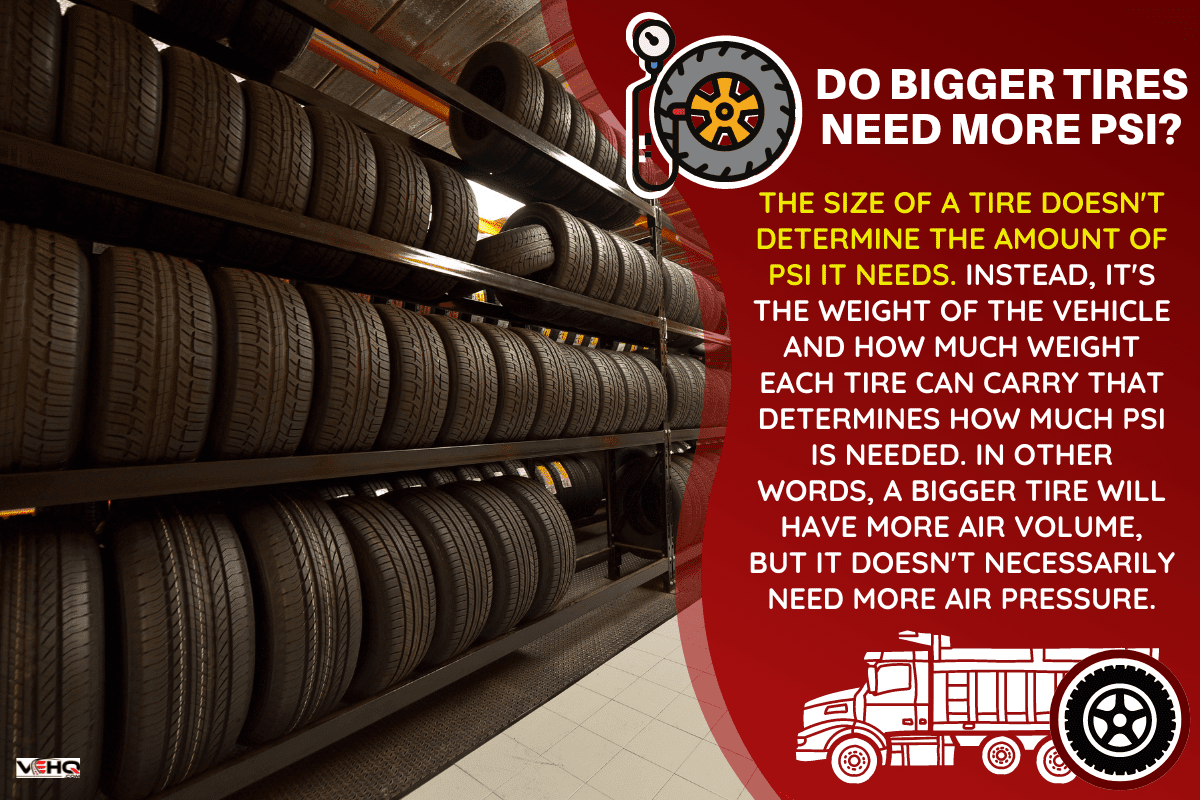
How Much Air Do Bigger Tires Need?
PSI, or pounds per square inch, is the unit used to measure air pressure. Every tire needs a specific amount of PSI to function correctly. The right PSI for your tires will depend on the make and model of your vehicle as well as the size of your tires.
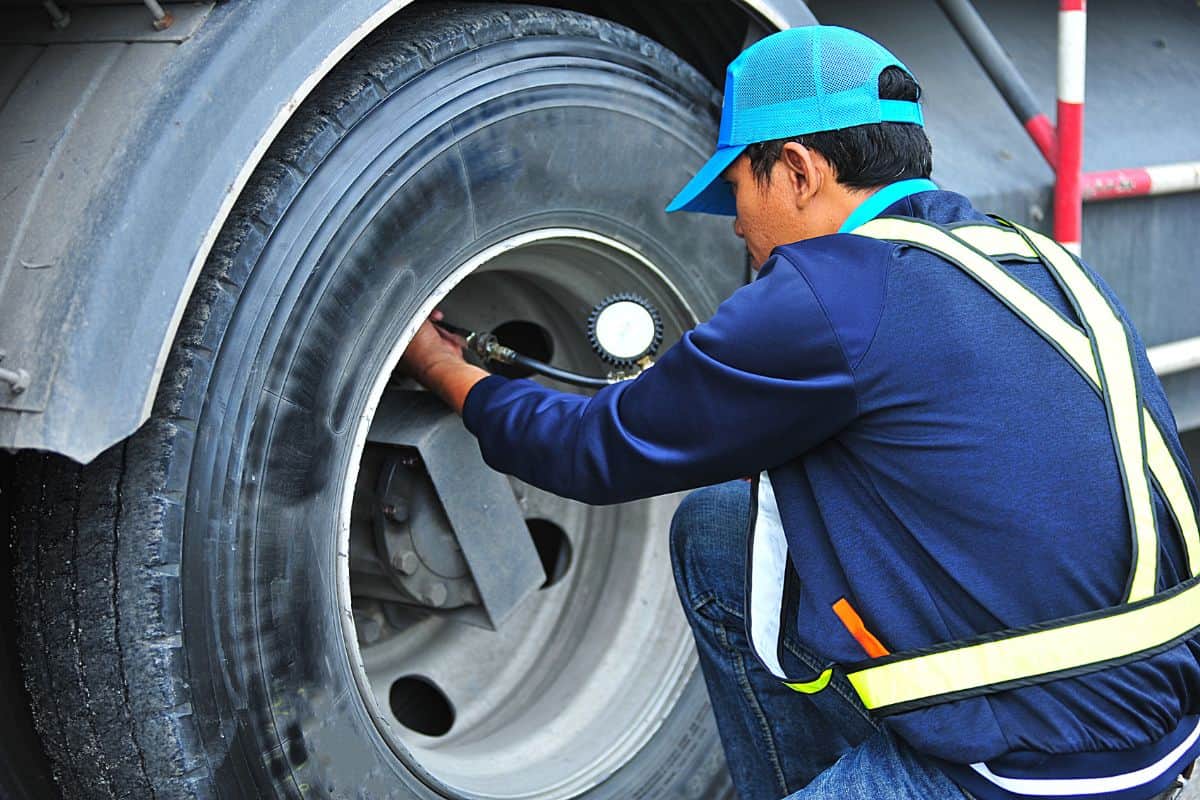
A tire's recommended PSI is determined by the load that it has to bear. The load is the weight of your vehicle plus anything else you might have in it, such as passengers or cargo. When buying new tires, you'll see a "load index" on the sidewall. This is the maximum amount of weight that a tire can safely carry.
In other words, the heavier the vehicle, the more air pressure the tires need. This is because a heavier vehicle puts more strain on the tires, so they need to be inflated to a higher PSI to support the weight.
On the other hand, if you put bigger tires on your car, it might not need as much PSI as it did with the smaller tires. That's because bigger tires have a larger air volume, so they can hold more air even at a lower PSI.
It's important to check your vehicle's owner's manual to see what the manufacturer recommends for tire PSI. In addition, if you decide to put bigger tires on your vehicle, speak to a tire specialist to find out what PSI is best for the new tires.
They may ask you questions based on the make and model of your vehicle, the size and weight of your tires, and how you plan to use the vehicle. For example, if you plan on loading the pickup truck bed often, you may need to change the PSI in your tires.
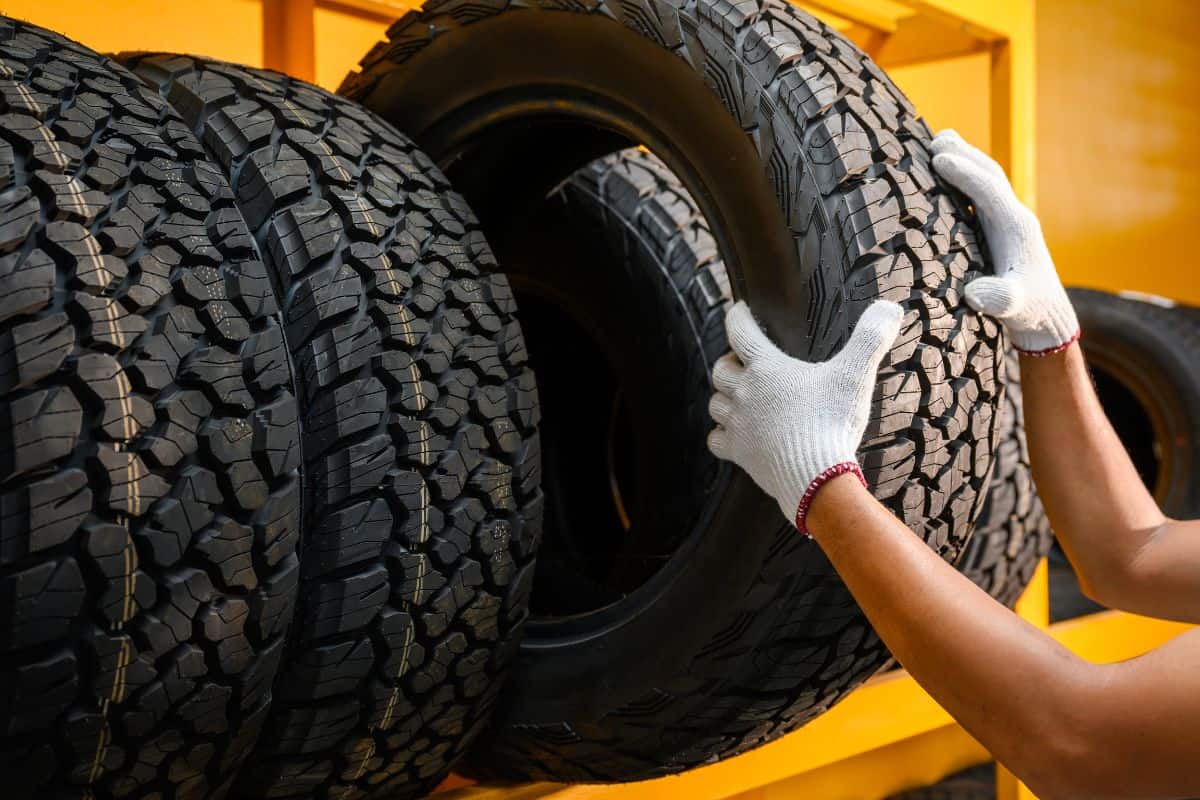
Should All Four Tires Have The Same PSI?
While it may seem that it makes sense for all four tires to have the same PSI, that's not always the case. In fact, it's not uncommon for the front and rear tires to have different PSI requirements.
The front tires typically need more PSI than the rear tires. This is because the front tires bear more of the vehicle's weight than the rear ones due to the engine being in the front.
The amount of PSI that your tires need will also change with the seasons. For example, in the winter, you'll need to inflate your tires more because the cold air causes the tire pressure to drop.
In general, double-check your vehicle's door jamb or owner's manual to see what the PSI should be for each tire during different seasons.
How Often Should You Check Your Tire PSI?
It's important to check your tires PSI at least once a month or more often if you notice that the pressure is low. You can use a tire pressure gauge to check the PSI of your tires.
To do this, simply remove the cap from the valve stem on your tire and attach the gauge. Once it's attached, the gauge will give you a reading of the current PSI in your tire.
If the PSI is low, use a portable air compressor or tire inflator to add air to your tires. Once the desired PSI is reached, remove the gauge and put the cap back on the valve stem.
It's important not to overinflate your tires. If you notice that the PSI is too high, use the gauge to release some of the air until it reaches the desired PSI.
In addition, if you plan on going on a road trip or carrying extra weight in your vehicle, it's a good idea to check your tire PSI before you hit the road.
This will help ensure that your tires are properly inflated and can handle the added weight.
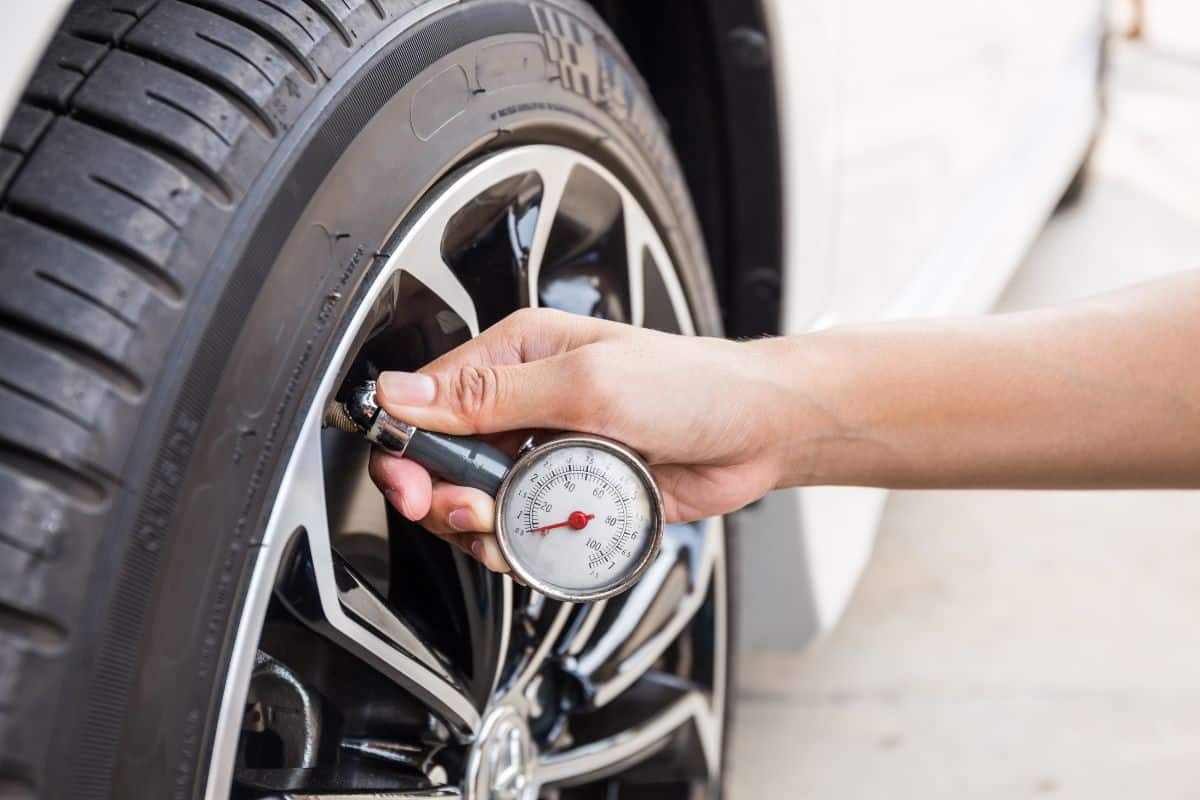
What Happens If My Tires Don't Have Enough PSI?
If your tires don't have enough PSI, it can lead to a number of problems. For one, your tires will wear out more quickly because they're not being supported properly. This can lead to bald spots or even blowouts.
In addition, low tire pressure can affect the way your vehicle handles. This is because the tires don't have enough gripping power, which can make it harder to steer, and braking distances will be longer.
Low tire pressure can also decrease fuel efficiency because the tires have to work harder to roll. This causes the engine to use more power, which burns more fuel.
What If You Have Too Much PSI In Your Tires?
There are also risks associated with having too much PSI in your tires. For one, the tires can become too hard, which can make them more susceptible to punctures and flats.
In addition, too much PSI can cause the tires to bow out. As a result, the middle of the tires will wear down more quickly.
Bowed tires can also affect the way your vehicle handles. This is because they don't have as much contact with the road, which can make it harder to steer, and braking distances will be longer.
Also, overinflated tires will make for a rough ride because they don't absorb shock as well.
If you notice that your tires are overinflated, use a tire pressure gauge to release some of the air until it reaches the desired PSI.
How Long Should Tires Sit Before Checking PSI?
There is a trick to checking your tires' PSI accurately, and it has to do with how long the tires have been sitting.
If you just drove your vehicle, the tires will be warm from the friction of the road. This can cause the pressure to increase by a few PSI.
As a result, it's best to wait at least two to three hours before checking the PSI of your tires. This will give the tires time to cool down and reach their true pressure.
If you have a digital tire pressure gauge, it may have a built-in temperature compensation feature. This means that the gauge will automatically adjust for any changes in temperature, so you can check your tires' PSI at any time.
Another easy way to check your tire pressure is first thing in the morning. This is because the temperatures overnight will have caused the pressure to decrease, so you'll get a more accurate reading.
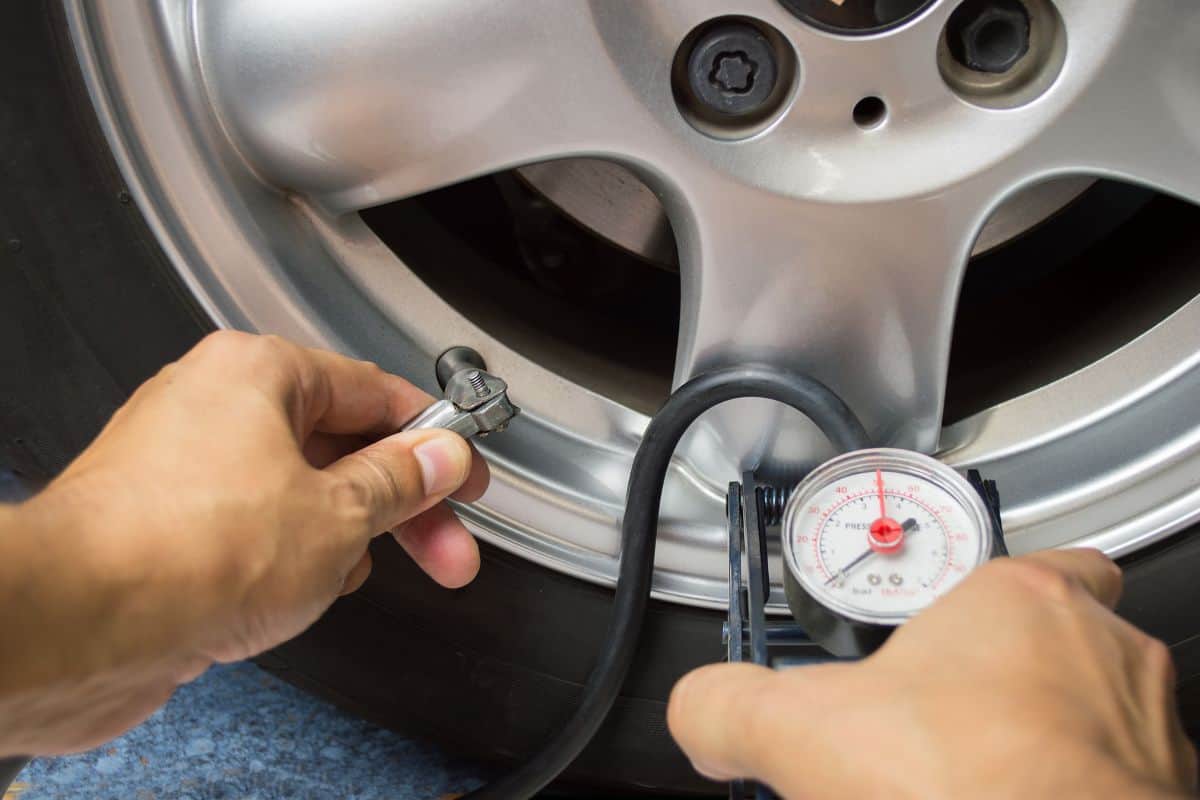
Should I Inflate My Tires In Cold Weather?
You will typically need to inflate your tires in cold weather. This is because cold temperatures cause the air pressure in the tires to decrease.
To compensate for this, you'll need to add a few PSI to your tires. In general, adding one to three PSI above the manufacturer's recommended PSI should be sufficient.
Keep in mind that you may need to check your tires more often in cold weather since the pressure can drop quickly.
You should also inflate your tires if you're going to be driving in snow or on icy roads. Lower air pressure can make it difficult for the tires to grip the road, which can cause slippage and accidents.
When Should I Reduce My Tires' PSI?
There are a few scenarios where you would need to reduce the PSI in your tires.
One example is if you're going to be driving on a sandy beach. The soft sand can cause the tires to sink, so you'll need to let some air out to give them more traction.
Another scenario is if you're going to be driving through deep mud or water. In these cases, you'll need to reduce the PSI to give the tires more contact with the ground.
You should also let some air out of your tires if you're going to be driving on a gravel road. The rough surface can cause the tires to wear down quickly, so lowering the PSI will help to reduce the amount of wear and tear.
Finally, you may need to reduce the PSI if your vehicle is overloaded. Typically, the PSI for towing is related to the max cold tire pressure. This will help to distribute the weight more evenly and prevent the tires from becoming overloaded.
Final Thoughts
No matter the size of your tires, always consult the manufacturer's recommendations for the correct PSI. Over-inflating or under-inflating your tires can cause a variety of problems, from decreased fuel efficiency to shorter tire life.
And, when in doubt, always err on the side of caution and talk to a professional. They will be able to help you determine the correct PSI for your tires as well as any other maintenance needs.
Made it to the end? Here are other articles you might enjoy:
Are Bigger Tires Better For Snow And/Or Ice?
